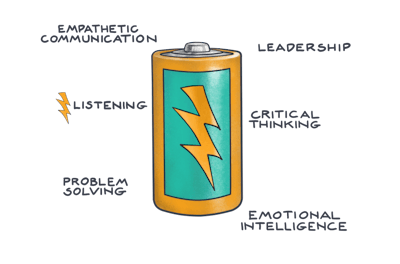If you keep your ear to the ground in the L&D space, you’ve probably come across the term ‘soft skills’, or more recently, ‘power skills’.
The term refers to human-centred skills like communication, critical thinking, and emotional intelligence. Without them, teams don’t function and problems don’t get solved. They are the backbone of the modern workplace.
Hard skills, in contrast, refer to the technical skillset required to do a job. Things like using Microsoft Word, fixing a car engine, and speaking French. They are specific competencies and knowledge required to perform a particular task or role.
Traditionally, hard skills have been the priority when looking to hire and train someone. They signify that somebody is qualified to do their job well. Don’t get me wrong – that’s really important! But, while hard skills are vital to getting particular tasks done, the pandemic showed us that power skills are more important than ever.
According to industry thought leader Josh Bersin, the skills of the future that companies need to hire for aren’t technical, but behavioural. He uses computer engineers as an example: yes, having people who can build and fix computers are important, but they are also tasks that can be hired externally (hello, Airtaskers!) and, in some cases, automated. What makes someone stand out is their people-centric skills such as the ability to communicate and adapt to change.
Generally, just like with hard skills, people have particular aptitudes toward different power skills. In the same way someone is stronger at maths than writing, some people are inherently more creative, or some people are natural problem-solvers.
But that’s not to say power skills can’t be learnt and developed – in fact, honing them is the key to high-functioning, productive teams.
Power skills are more than a business skillset – they are useful in any context. They are people skills, and are necessary for nurturing relationships both related to and outside of work. And for that reason, they are in high demand, both from employers and employees.
Why do you call them power skills?
I mentioned before that power skills are often also called soft skills.
Human-centric skills have traditionally been thought of as less important, however all current research points to them as being at the core of the future of work.
Josh Bersin talks about how soft skills need to be seen as powerful in the workplace: “they are difficult to build, critical, and take extreme effort to obtain”. They are highly complex and are always developing.
He also pushes for the reframing of ‘soft’ skills as ‘power’ skills. They aren’t soft – they’re powerful!
And Josh is in pretty good company. Simon Sinek also talks about how “soft skills aren’t soft at all”. All the cool people have decided they won’t call them soft skills, instead, they’ll call them power skills.
So that’s why we’re going with power skills too.
Why should I invest in power skills?
According to Wiley, the most important 21st-century workplace skill is a power skill: problem-solving. The World Economic Forum has identified the top 10 skills of 2025, including 9 power skills. If that wasn’t enough to convince you, they are commonly the most in-demand skills from employers – around 93% of hiring managers see power skills as ‘essential’ or ‘very important’ when making hiring decisions.
The working world is in a state of flux: hybrid working is on the rise, more people are working from home than ever before, and the demands of the workforce are changing. Employees are actively looking for L&D opportunities from their employers, and given that power skills are at the top of the demands list, those are the skills people are most interested in developing.
To meet the ever-changing priorities of the modern workplace, and best position your organisation to thrive, investing in power skills is vital.
Here are a few key ways in which investing in power skills training will level up your organisation:
Staff retention
Companies that struggle with manager support are 50% more likely to face high levels of staff turnover. 66% of employees will quit if they feel underappreciated at work, so leadership and communication skills are vital to helping your staff stick around (but more on that later!). Linkedin recommends investing in soft skills for managers, such as leadership skills and empathetic communication, is the key to attracting and retaining talent by promoting a positive working environment, in which staff are more likely to stay.
Having a learning strategy in place that covers relevant power skills is imperative to effective teamwork and an adaptive workforce. It is also a priority for employees looking to develop leadership and managerial capabilities. If someone wants to grow their career but isn’t given the opportunity to learn and practise the skills they need to progress, they might start looking for a new company where they can.
Creating an anti-fragile workplace
When the pandemic first hit, many companies were faced with the dilemma of how to work. Teams that had never worked remotely before were forced to learn how to use Zoom, Slack, and other remote productivity platforms. Office-based work completely transformed, with people used to working side-by-side now working together through a computer screen.
Teams with strongly developed power skills, like problem-solving, strategic thinking, and adaptability, thrived. Unless your people can quickly adapt to change, your business productivity will halt when something unexpected happens. Having a team skilled in problem-solving, for example, means they may foresee sudden change, and be able to plan future business activities around that.
Teamwork
Imagine someone new joining your team. On paper, they are the bee's knees – they are super qualified, come with a ton of new ideas, and are really excited to jump in. But, after the first week, you find they aren’t quite gelling with the team. They’re steamrolling their ideas, and not listening to other members of the team's feedback.
This is a fairly common scenario – and while it could signify a culture gap, it probably is more likely that the new hire isn’t quite up to scratch on their power skills. Active listening and teamwork may not be something they’re used to, so they are skills that need to – and can be – developed!
Inevitably, companies will have people with different – and conflicting – personalities and working dynamics. Dealing with conflict, clear communication and feedback are all vital skills for working productively in a team.
Stronger, more effective, leadership
Power skills are commonly understood to be the backbone of the modern leader.
Business Insider has assembled a list of 20 power skills necessary for strong leadership, including negotiation, adaptiveness to change, and delegation. Working on developing these skills organisation-wide prepares your team for internal promotion.
A manager can have all the know-how and credentials in the world but still be a pretty bang-average leader. Unless they know how to communicate empathetically, listen and respond to feedback, and coach their people, they may find that their teams aren’t working very effectively, and their staff may even start looking for a new job.
Stronger remote/hybrid teams
Power skills are critical in hybrid and remote workplaces. Skills such as communication, self-motivation and digital skills are all conducive to effective remote working. Other skills that are likely to crop up in a remote or hybrid team are critical thinking and adaptability.
Staff are more likely to work on their own at home, so may need to be more self-sufficient with decision-making and tech fluency than before. Building confidence in these areas will support people to feel more comfortable in their roles.
Leading a team remotely is no mean feat, and managers need to be able to have difficult communications digitally and be able to check in with their people without the convenience of an office. Developing leadership capabilities so they are remote-friendly is just as important as in-person communication skills. Albeit, much harder.
How does Yarno train power skills?
At Yarno, we strive to create a culture of continuous learning. Our four key values are:
- Beginner’s mind
- Check your ego
- Ever forward, and
- Delight the customer
These values show our commitment to investing in learning, and always striving to grow.
We work hard to develop the power skills of Yarnoers, alongside hard skills.
We are big believers in feedback and empathetic communication, so we work on them every day! We run monthly Courageous Feedback sessions, where we role-play giving both positive and constructive feedback in a number of different scenarios. It’s a great way of developing communication skills and confidence in empathetic situations. Every session is a new lesson, and it is a great way of honing our feedback techniques – both when giving and receiving!
We also focus on delivering presentations and public speaking skills by randomly assigning the regular team WIP meeting to a new person every week. Yarnoers are encouraged to present PechaKucha presentations or Lunch and Learns to further develop their presentation capabilities.
Another great way we foster power skills is to involve Yarnoers in different tasks than they would normally be involved in. Allowing them to work with different people and complete new tasks (for them) builds both teamwork skills and requires problem-solving and critical thinking to complete the unfamiliar task. For example, anyone is welcome to help out the Devs team with testing a new version of the product.
We also use Yarno to complete monthly microlearning campaigns, many of which are geared toward power skills training. We recently ran a campaign about understanding and overcoming procrastination, which was a great way to develop skills in understanding mental health and motivation.
Other campaigns we have run include mental health and empathetic communication. Having a focus on developing power skills in our regular campaigns means we are all working together to gain confidence in interpersonal communication, and working towards a more efficient remote working environment.
Power skills are on the rise, and they aren’t going away. If you aren’t currently training them or encouraging your team to develop them, you might find yourself in some hot water.

